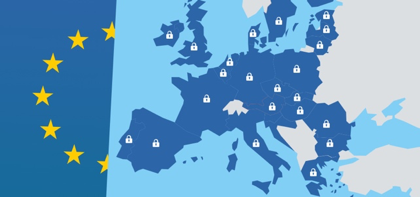By Marielena Reyes
Advertisers have historically used consumer data to target ads by analyzing and tracking the online behavior of users, which has created international tension.[1] For example, social media networks’ ability to capture user data and sell it to third parties has grown significantly in the last decade, which has compelled advocates around the world to push for new data collection reforms.[2] As a reaction, the European Union approved a new set of regulations in 2016 designed to harmonize and efficiently enforce Europe’s privacy laws, the General Data Protection Regulation (GDPR).[3] The GDPR will apply to all 28 EU member states and any other country that processes or controls EU citizen’s personal or identifiable information.[4] The hefty regulations are vast and, if not followed strictly, could result in a 20 million dollar fine or 4 percent of a companies’ gross domestic product (GDP), whichever is more.[5] GDPR advocates have pushed for tech giants to convey to customers how and where their data is being used and transmitted.[6] Prior to the GDPR, websites could prevent users from accessing or utilizing their platforms if a user declined to agree to their terms and conditions of service.[7] This left users helpless to alter or negotiate any terms.[8] Once the GDPR goes into effect, companies and tech giants like Facebook will be required to get permission from each user to collect, share, and combine their data for use by advertisers.[9]
In response to these concerns, Facebook has introduced users to its newest privacy platform by releasing educational videos and publishing their privacy principles for the first time.[10] Facebook’s newest initiative has placed privacy considerations back in the hands of consumers by unveiling a new privacy center.[11] The privacy center is premised on the idea that consumers not only be aware of, but also be in control of the flow of their personal information.[12] This comes only months before the EU General Protection Regulation (GDPR), [explain GDPR] takes effect in May.[13]
The privacy principles outline what most “terms and conditions” nerds like myself already know: Facebook gives users control their privacy settings, scans for threats, lobbies legislators, and design their products with privacy in mind (i.e., security).[14] The newer features include user ownership of their information shared and privacy controls built into Facebook’s products from the outset.[15] Of these new features, the most important include the social network’s key privacy settings finally being in one place and providing users “privacy checkup” reminders to ensure that users are informed about data potentially being shared.[16]
At a Facebook event in Brussels, COO Sheryl Sandberg told the crowd that Facebook has assembled the “largest cross functional team” in its history in order to support GDPR compliance.[17] With billions of dollars at stake, companies like Facebook have a huge incentive to roll out new privacy standards.[18] Facebook just happens to be the first major company to do so, but many speculate that there will be more to come.[19] Facebook has made a lot of changes to their privacy and controls in the last decade aiming to give people more “transparency and control.”[20] But in reality, Facebook has faced immense criticism, lawsuits, and fines regarding privacy issues from the Federal Trade Commission, the European Commission, the Irish Data Protection Commissioner, and more.[21] These issues revolved around simplifying their privacy settings by using secure default settings, avoiding deceptive practices, and updating consumers on policy changes.[22]
Regardless, Facebook’s privacy center remains one of the largest overhauls of personal data privacy rules with over 2 billion users worldwide.[23] As the most historical regulatory crackdown of data information approaches, the world awaits in eager anticipation for what will happen next.
[1] See Paul Blumenthal, Facebook And Google’s Surveillance Capitalism Model Is In Trouble, Huffington Post (Jan. 29, 2018, 12:01 PM), https://www.huffingtonpost.com/entry/facebook-google-privacy-antitrust_us_5a625023e4b0dc592a088f6c.
[2] Id.
[3] Id.
[4] See Hamza Shaban, Facebook Braces For New E.U. Privacy Law, Wash. Post (Jan. 29, 2018), https://www.washingtonpost.com/news/the-switch/wp/2018/01/29/facebook-braces-for-new-e-u-privacy-law/?utm_term=.ce4c2f9f792e.
[5] See Jessica Guynn, Facebook to launch privacy center ahead of EU regulations, USA Today (Jan. 29, 2018, 2:11 PM), https://www.usatoday.com/story/tech/2018/01/29/facebook-launch-privacy-center-ahead-eu-regulations/1071430001/.
[6] Id.
[7] See Paul Blumenthal, Facebook and Google’s Surveillance Capitalism Model is in Trouble, Huffington Post (Jan. 29, 2018, 12:01 PM), https://www.huffingtonpost.com/entry/facebook-google-privacy-antitrust_us_5a625023e4b0dc592a088f6c.
[8] Id.
[9] Id.
[10] See Shaben, supra note 4.
[11] See Guynn, supra note 5.
[12] Id.
[13] Id.
[14] See Thuy Ong, Facebook Begins Pprivacy Push Ahead of Tough New European law, The Verge (Jan. 29, 2018, 7:08 AM), https://www.theverge.com/2018/1/29/16944304/facebook-privacy-eu-law-general-data-protection-regulation.
[15] Id.
[16] Id.
[17] See Natasha Lomas, Facebook to Roll Out Global Privacy Settings Hub – Thanks to GDPR, TechCrunch (Jan. 24, 2018), https://techcrunch.com/2018/01/24/facebook-to-roll-out-global-privacy-settings-hub-thanks-to-gdpr/.
[18] Id.
[19] Id.
[20] Id.
[21] Id.
[22] Id.
[23] Id.


